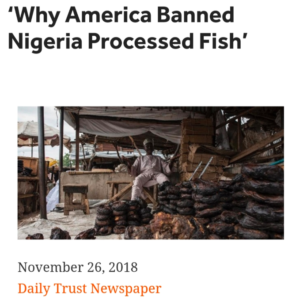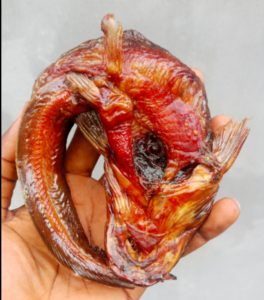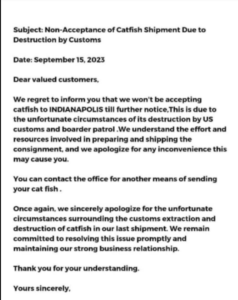The United States of America wrote to the Federal Department of Fisheries through the Ministry of Agriculture, Abuja, asking for details of farmed fish production some years back. Headline News

Before this, Nigerian fish farmers had been exporting dried catfish to the United States of America in smaller quantities. The Nigerians in the diaspora and Africans, in general, have a penchant for our dried or smoked catfish.
Upon discovering that open-fire smoked fish contains cancerous carbon monoxide, we transitioned to alternative drying methods such as charcoal, gas, and electricity.

However, when we reached out to the Department of Fisheries and Aquaculture regarding the switch, there was no response, and they kept stakeholders, including association leaders, in the dark—an unpatriotic act bordering on treason.
Shockingly, Nigerian dried fish faced rejection at the US border, resulting in significant financial losses for many. Despite reaching out to various agencies such as the embassy, FDA, NAFDAC, NEPC, and Customs, only the FDA provided a response.

The FDA directed us to the ministry, where we encountered obstacles. Ultimately, during discussions with the US embassy in Nigeria, we learned about the letter requesting information on our production activities.
While other countries promptly responded to the same letter, Nigeria’s government remained silent, failing to inform fish growers. The US sought details on our cultivation methodology to certify our fish for their market, presenting a missed opportunity for foreign exchange earnings.
Instead, Nigeria’s federal fisheries departments focused on allocating fish importation quotas to influential importers, including retired military personnel, granting them unlimited access to dollars from CBN.
Imported fish, such as Croaker, Titus, and mackerel, are sourced from saltwater and cannot be cultured in our freshwater. Despite the environmental impact, some Nigerians prefer foreign products.
Yearly quotas are awarded to big companies owned by influential individuals who bribe Fisheries officials for the required signatures to access dollars for imports, contributing to the nation’s economic challenges.
Furthermore, some imported fish are caught in Nigerian waters by foreign trawlers, exported, and then brought back into the country, exacerbating poverty and draining foreign exchange.
The challenging business environment in Nigeria, marked by bad roads, lack of power, and multiple taxation, deters local producers. The AFDB president highlighted Nigeria as one of the most difficult places to export from, citing exorbitant costs compared to other African countries.
Neighboring countries exploit this situation, entering Nigeria to acquire processed fish, repackage it, and export it as their own, earning foreign exchange for their nations.
To address the situation, we are appealing to the US government for a second chance. We aim to provide comprehensive information on how we organically and safely grow and process our fish for human consumption. However, concerns remain about potential delays and exploitation by Nigerian agencies during exportation.
The duplicity of agency functions, demanding clearance through multiple authorities, creates unnecessary bottlenecks for exporters. Despite these challenges, Nigerian fish farmers produce top-quality fish and are continually improving through capacity-building initiatives.
The need for a shift in priorities, favoring farmed fish exportation over importation, is crucial for optimal use of the country’s resources. A call for patriots in leadership positions, from civil servants to politicians, echoes the sentiment that a prosperous Nigeria benefits everyone.











